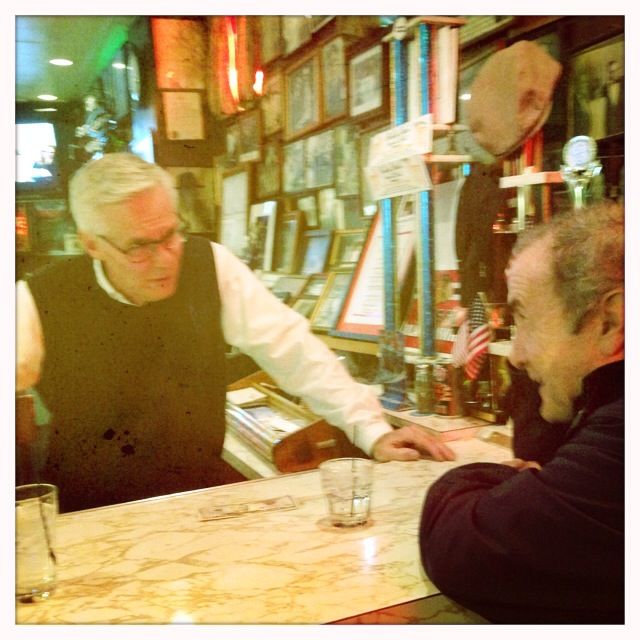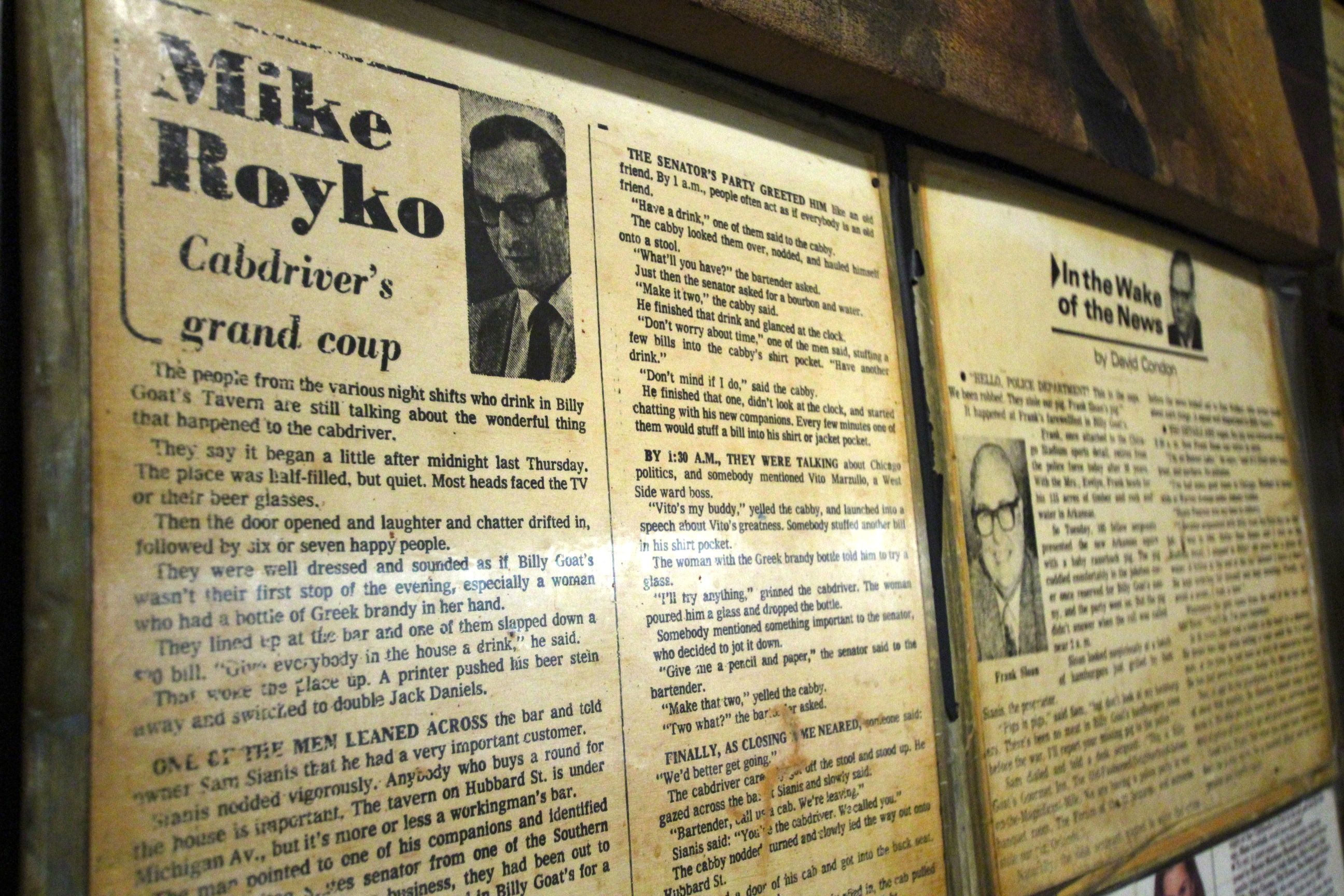Chicago reporters lament the possible loss of the iconic Billy Goat Tavern
By Robin Amer

Chicago reporters lament the possible loss of the iconic Billy Goat Tavern
By Robin AmerThe Billy Goat Tavern beckons passersby in from the dank depths of Lower Michigan Avenue with neon lights and the fragrant smell of hamburger grease.
There are no fries here, only chips, but you can get a double from the short-order cooks in their old-fashioned white paper hats, and eat it on the marbled linoleum counter under the portraits and bylines of Chicago’s greatest reporters.
Regulars ordered their beers Tuesday from longtime bartender Jeff Magill, who handed a set of Miller Lites to a pair of businessmen stopping in from the avenue above.
“Here,” he said. “Before they tear the place down.”
The Billy Goat’s main location (there are eight total) is here in the basement of 430 N. Michigan Ave. The building’s upper floors house the Chicago branch of the National Association of Realtors. The group said Monday that it plans to redevelop the tower into a “world-class property” with 1.2 million square feet of condos, office space, ground level retail and a five-star hotel.
In the process, the Realtors said, the Billy Goat would be “temporarily displaced.”
What that means, exactly, is unclear. The Realtors’ plans seem to include tearing down the existing building, although a representative for the group could not confirm that Tuesday. The association said previously that it plans to make some kind of accommodations for the restaurant, which owner Sam Sianis said Wednesday has another 10 years on its lease.
But even if the Billy Goat were to return here in some new incarnation at a later date, the particular spot the restaurant has occupied since it moved here in 1964 from its original location on Madison Street could soon be no more.
And while many Chicagoans — and more than a few tourists —would mourn the loss, one subculture would be especially hard hit: the city’s newsmen, as they were once called.
The Billy Goat has long been a gathering spot for the reporters, editors, printers and press-runners that made the business hum.

Case in point: Tribune columnist and WGN host Rick Kogan was at the Billy Goat Tuesday night, drinking vodka on the rocks. He literally wrote the book on this place – “A Chicago Tavern: A Goat, A Curse, and the American Dream” – as well as a book on Chicago saloons.
“No one came in here talking about the f***ing Cubs curse in the ’70s,” Kogan said Tuesday, referring to the oft-cited legend that the team’s poor performance was caused by a hex hurled at them by the original owner and his pet goat.
Rather, “you’d come in here and it would be 70-80 percent newspaper folk in the day,” Kogan explained. “It was the type of place that a certain kind of newspaper worker wanted.”
There were four papers all within shouting distance, and the Tribune and the Sun-Times still had their presses nearby. Between the printers and the pressmen and the linotype guys, “there was a huge crowd of potential customers,” Kogan said. In addition to burgers and beer, the tavern sold canvas gloves for $.75 a pair to the men who tossed papers from the circulation trucks.
When the Sun-Times’ photographers were laid off earlier this year, most consoled themselves afterward with a drink at the Billy Goat.
The bar’s most famous regular, of course, was columnist Mike Royko, who won a Pulitzer Prize for commentary in 1972. He liked to say he knew a thing or two about taverns, having grown up the son of a barkeep himself, and called the Billy Goat his favorite.
“This isn’t one of those sophisticated places on Rush Street,” Royko wrote in 1974. “It’s the closest thing to a neighborhood bar that you can find in that part of town.”
Royko upped his hours here after the death of his first wife, Carol, in 1978. His second wife, Judy, told Rick Kogan she believed the Billy Goat took him “back to his childhood before he was famous and everybody wanted a piece of him.”
“And

“The city is an organic thing,” he said. “It changes.”
If the Realtors want to build here, he said, that’s their right.
He even had his doubts that a younger generation of drinkers would notice.
“Most young people don’t give a s*** about the history,” Kogan said. “Just go to Hubbard Street and see the people lined up.”
But younger reporters have their own sentiments about the place. WBEZ contributor Alison Flowers and Tribune reporter Gregory Pratt were at the Billy Goat Tuesday, too, drinking drafts and eating doubles.
“There are a lot of places to drink, but that one’s ours,” Pratt said.
Another young woman there Tuesday turned out to be Kristen Dold, daughter of Bruce Dold, the Tribune’s editorial page editor.
“When I first read the article I was like, oh s***,” she said. “If this place were to be shut down it’s a huge loss. It’s like our living room being taken away from us.”
Dold said she was here to add her father’s name to the wall of legends — a touching tribute.
“My dad’s worked at the Trib for over 35 years, and I basically grew up here,” she said. “I wanted to get his name on the wall. I just wanted to make sure that it was up there in case anything happened.”
We found the elder Dold dining next door at Phil Stefani’s 437 Rush. His companions were the attorney Marshall Seeder and Bill Singer, the former alderman and the last person to challenge Richard J. Daley in a mayoral election.
Bruce Dold did seemed touched by his daughter’s efforts, if a bit shocked.
“She said she thought it would mean a lot to you,” I explained.
“Really?” Dold asked. “Just in time for the whole place to be torn down!”
Dold joked that there might be a space in the Tribune Tower that could be up for grabs. Perhaps the Billy Goat could move there.
“Put that in your story!” Seeder laughed.
“Bruce Dold suggested….” Kogan said, interrupted by Singer.
“No, Bruce Dold offered!”
“At very least they should take one of the hamburgers and stick it in the wall,” Seeder said.
Like a piece of the Great Pyramids or a moon rock. Or a bit of a neighborhood tavern.
Follow Robin Amer on Twitter @rsamer.
Editor’s Note: A previous version of this story misattributed the final quote to Bruce Dold instead of Marshall Seeder. Also, Mike Royko won a Pulitzer Prize for commentary, not criticism, as originally stated.

